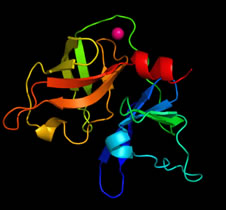Design of therapeutic agents against Hepatitis C Virus and efficient fluorescent probes for screening of antiviral agents.

Hepatitis C affects more than 170 million people worldwide and this chronic disease often leads to liver cirrhosis and hepatocellular carcinoma. Among several important drug targets, the NS3/4A protease of hepatitis C virus (HCV) has emerged as a critical target for HCV therapy. The NS3/4A serine protease of HCV is responsible for the cleavage of viral nonstructural polyprotein and its activity has been shown to be essential for the maturation of the viral proteins.
These research projects focus on two major goals: a) design and synthesis of two families of HCV NS3/4A protease inhibitors as antiviral agents, and b) development of efficient fluorescent protease probes to evaluate the antiviral efficacy of the HCV inhibitors designed in our laboratory.
For more information on this project, please email the DCM Lab: dcarrico@wellesley.edu
See also: Design and synthesis of naturally occurring organic molecules and analogues as anticancer agents
